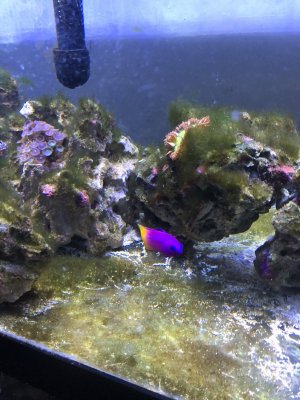- Joined
- Sep 7, 2018
- Messages
- 171
- Reaction score
- 74
Hey everyone so let me explain what’s going on. I have a pic to show the terrible gha. I’ve neglected it for a good month or two and obviously it’s gotten a little crazy now. My options are. 1. Taking everything out scrub the rocks normally, and scrub the bottom floor and do a big water change.
Or 2. Take out the rocks soak them in hydrogen peroxide (3% or 35%) not sure which they say both works good but I feel mine is more severe so 35% might do, but soak them and then rinse them and let them sit in a clean bucket water for a day or two and then add them back into the display. My question is once I’m back in routine of maintenance and keeping things up to par, will the rocks leech the hydrogen peroxide in the main display tank? Is that bad? Will gha come back with a vengeance!?
And final #3 option. Just dosing .5ml of hydrogen peroxide a day and do water changes 10-20% weekly until it all just dissolves away??
And I am aware the good bacteria will die if I h202 them but my plan for that is to start fresh completely with new everything rinse the tank new water new filters and let my canister filter bring back the gold bio load from what’s in filters already. And letting it cycle good n then adding the fish back in and acclimating coral and fish again. What you guys think?

Or 2. Take out the rocks soak them in hydrogen peroxide (3% or 35%) not sure which they say both works good but I feel mine is more severe so 35% might do, but soak them and then rinse them and let them sit in a clean bucket water for a day or two and then add them back into the display. My question is once I’m back in routine of maintenance and keeping things up to par, will the rocks leech the hydrogen peroxide in the main display tank? Is that bad? Will gha come back with a vengeance!?
And final #3 option. Just dosing .5ml of hydrogen peroxide a day and do water changes 10-20% weekly until it all just dissolves away??
And I am aware the good bacteria will die if I h202 them but my plan for that is to start fresh completely with new everything rinse the tank new water new filters and let my canister filter bring back the gold bio load from what’s in filters already. And letting it cycle good n then adding the fish back in and acclimating coral and fish again. What you guys think?





















